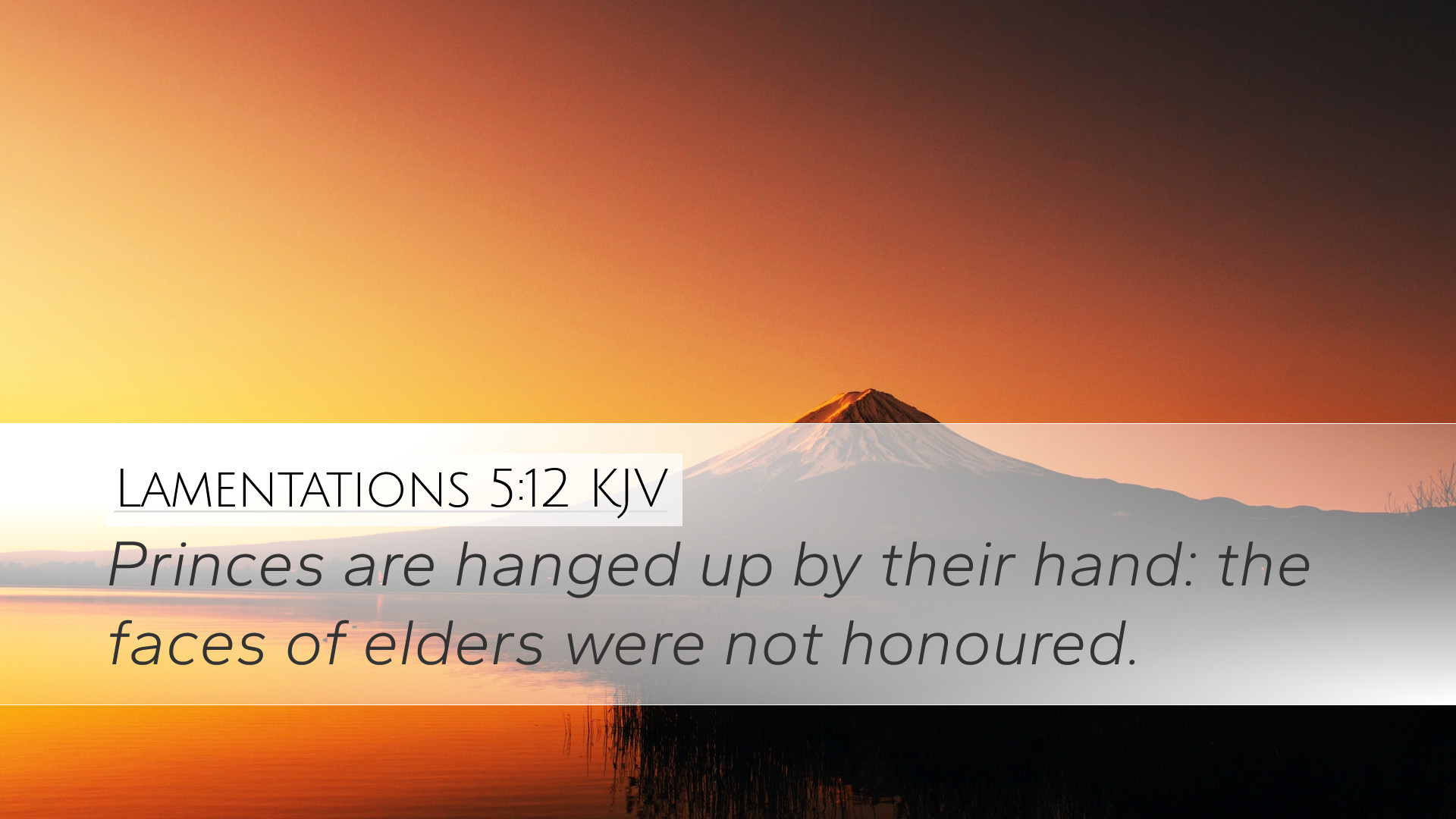Lamentations 5:12 - Commentary and Insights
Bible Verse: "Princes have been hanged up by their hand: the faces of elders were not honored."
Contextual Overview
The book of Lamentations is traditionally attributed to the Prophet Jeremiah, reflecting on the profound sorrow and suffering experienced by the Israelites after the fall of Jerusalem. Lamentations captures the emotional turmoil of God's chosen people in a time of profound national and spiritual crisis. Each chapter reflects on different aspects of suffering, guilt, and the hope of restoration.
In chapter 5, the focuses are on communal sorrow and the dire situation that has befallen the nation. It is crucial to comprehend the grief expressed here as a reminder of the consequences of sin and the nature of divine judgment.
Commentary by Matthew Henry
Matthew Henry emphasizes the stark contrast between the dignity of positions such as princes and elders, and their collective humiliation in this verse. He notes:
- The Fall from Honor: The princes, once revered, are depicted as being hanged, which illustrates a complete reversal of status during the period of calamity. Henry suggests this indicates the collapse of societal order and justice, wherein those in authority are subjected to shame.
- Loss of Respect: The elders, who should command respect and honor, are in a state of disrepute. Henry argues this reflects not only the humiliation of individuals but also the national disgrace experienced by the people.
Henry concludes that such extremes of judgment highlight the severity of the situation and serve as a warning against the consequences of abandoning faithfulness to God.
Commentary by Albert Barnes
Albert Barnes provides a theological analysis of this verse, indicating that the hanging of princes and the dishonor shown to elders is emblematic of the divine retribution that results from Israel's disobedience. Barnes points out:
- Divine Justice: The punishment reflected in this imagery illustrates how leaders fail to protect and lead their people rightly, thus inviting God’s judgment.
- Social Impact: The public execution of princes signifies the total breakdown of societal norms, offering insight into how deeply the sin of the people impacted their national wellbeing.
Barnes asserts that this dire depiction serves as a poignant reminder of the expectations of leaders and the accountability they hold, both to God and to the people.
Commentary by Adam Clarke
Adam Clarke's interpretation of Lamentations 5:12 focuses on the societal implications of the verse. He remarks:
- Symbol of Despair: Clarke interprets the hanging of princes as a harsh symbol of disbelief and despair that reigned within the Jerusalem society. It signifies how far the people have fallen from their former glory.
- Leadership Failure: He notes that the loss of honor among the elders indicates a failure of community leadership to guide the people correctly and protect the righteous.
Clarke encourages his readers to reflect on the importance of righteous leadership as a crucial element for societal health and peace, drawing a parallel to contemporary contexts.
Theological Reflections
This verse not only serves as a lament for a fallen nation but also as a profound spiritual lesson for readers today. The humiliation of leaders highlights the spiritual consequences of corporate sin. In a time where the lack of integrity in leadership is prevalent, this passage calls for reflective examination on:
- The Role of Leaders: Every leader bears responsibility not just to guide but to exemplify integrity and justice, mirroring God’s righteousness.
- The Consequences of Sin: Just as Israel faced dire outcomes due to their disobedience, societies must be wary of straying from moral and spiritual ethics.
Conclusion
Lamentations 5:12 is a powerful representation of the consequences of sin and the critical importance of righteous leadership. By combining insights from Matthew Henry, Albert Barnes, and Adam Clarke, it is evident that there lies a rich tapestry of meaning within this verse, encouraging pastors, students, and theologians alike to reflect deeply on their call to uphold integrity and justice within their communities.


